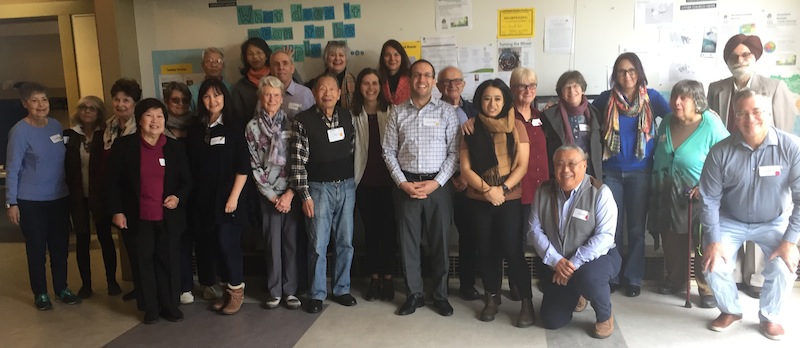On Oct. 30, members of different cultural groups gathered to discuss issues facing seniors. (photo from JSA)
Aging Across Cultures Dialogue Tables included an Oct. 30 gathering hosted by Jewish Seniors Alliance of Greater Vancouver at the Unitarian Centre.
The B.C. Ministry of Tourism, Arts and Culture has provided funding for a focused review of services, concerns and challenges faced by organizations providing help to multicultural seniors in the Lower Mainland. In addition to the JSA, Jewish Family Services and the Kehila Society were among the groups represented, which also included ASK Friendly Society, B.C. Community Resources Network, Kitsilano Neighbourhood House, United Way-Better At Home, Collingwood Neighbourhood House, COSCO, 411 Seniors Centre Society, Gordon Neighbourhood House, Marpole Neighbourhood House, Simon Fraser University Gerontology Research Centre, Vancouver Seniors Advocate, Seniors Brigade Society of British Columbia, Seniors First B.C., South Granville Seniors Centre, Tonari Gumi, Vancouver Native Health Society, and West End Seniors Network.
On Oct. 30, Gyda Chud, co-president of JSA, welcomed participants, emphasizing advocacy, reflection and rejuvenation as illustrated in a new JSA video outlining its community services. Grace Hann and Charles Leibovitch, from JSA’s peer support services, were the facilitators for the multicultural dialogue tables. Liz Azeroual of JSA documented on flip charts the ideas and concepts put forth by the participants.
Whatever the needs of seniors in general, discussants agreed that the situation is worse for immigrants and for women; many must choose between either eating or taking their medications. Immigrant women are less likely to be accepted for financial aid. Literacy is an issue, especially when applications for help are online, and navigating the system is more difficult when English is not your first language.
Without family advocacy, many seniors are left to fend for themselves. They need places to meet other seniors who have similar language, customs and experiences. In care facilities, many immigrant seniors are forced to eat unfamiliar foods. Immigrant seniors, especially women, need advocates to get their needs met, but community-based organizations working with seniors often are not well-funded, so help is minimal. The medical system is not structured to treat the multiple problems of seniors.
Loneliness and isolation are among those issues. Family groupings are now much smaller, and young families do not live in the same area as their parents or grandparents. Some seniors are abandoned by their families, or by the death of friends and colleagues. There is a lack of social support, transportation and financial aid to address these problems. Health issues such as depression, fractures that limit mobility, and degenerative hearing and sight increase isolation. LGBTQ+ seniors may also be underserved and isolated. There is a need for better communication all round.
Low-income seniors often move into single-room facilities, if they are available, or some become homeless, living in cars or couch surfing, as they cannot afford higher rents.
Paid caregiver turnover and the deteriorating quality of some care facilities has led families to care for their loved ones at home without adequate financial support. Caregiver burnout is a major concern and accessing certain types of care is a huge challenge: palliative care, for example, requires a physician’s referral.
Population movement and growth, and changes in the healthcare industry, are taking place without adequate planning for the changing needs of the senior population. For all workers, including professionals, who come from a non-English-speaking country, language training is necessary and difficult. Families need paid work in stable jobs and so do seniors. Volunteers are hard to recruit and retain, even though it is meaningful work and can lead to other jobs. In addition to language, many new Canadians need to learn more about technology and Canada’s corporate and general culture. In many areas, discrimination is an issue faced by new Canadians.
All Canadians need to plan for retirement, which is becoming costlier, as the population ages and services become more expensive. Various healthcare agencies need adequate funding to keep the elderly out of hospitals, and the links between different levels of health care and social services (clinics, hospitals and nonprofit agencies) need to be strengthened in order to keep this population from falling through the cracks. Access to transportation is a big part of this, and caregivers should be remunerated for providing home care for seniors. Cultural and ethnic care facilities could play a larger role in reducing isolation, offering spaces where language, food and culture are familiar and where families of seniors can meet.
Seniors housing was considered the highest priority. The need for more single-room affordable housing units, more cooperatives, more roommate pairing services and stricter legislation for affordable-housing vacancy rules were discussed. It was also believed that immigrants and 55-to-65-year-old seniors needed more access to Canada Pension Plan and Old-Age Security.
At the end of the discussion, Dr. Gloria Gutman, from Simon Fraser University’s Gerontology Research Centre, stressed the needs for groups to keep communicating at all levels to help resolve these major seniors’ issues.
Pamella Ottem, MSN, worked for many years in the field of gerontology. As a retired nurse, she has volunteered in the Fraser Health Authority hip replacement program. At Jewish Seniors Alliance, she is a member of the board and chairperson of the peer support services committee.

